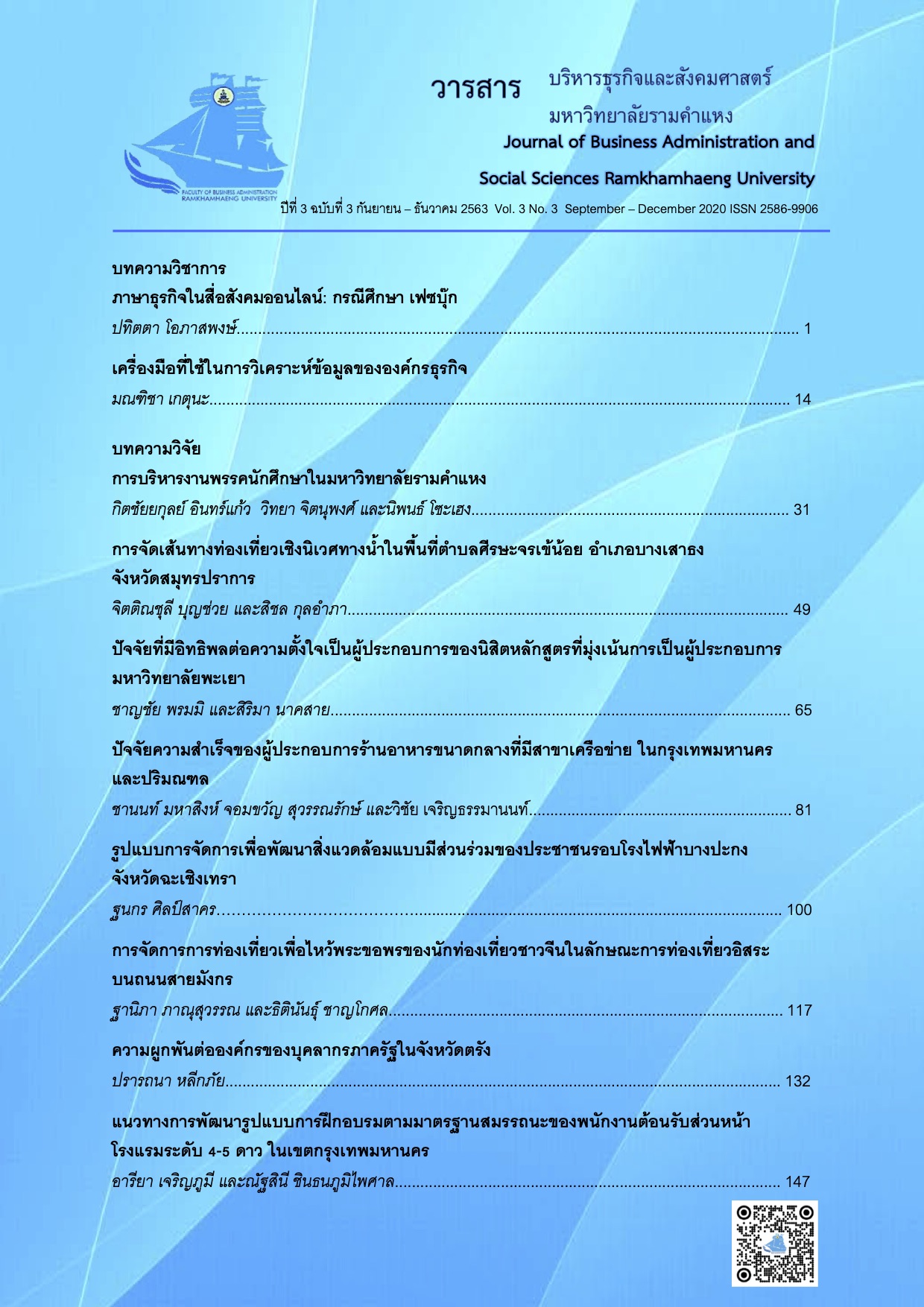Factors Influencing Entrepreneurial Intentions of Students in the Entrepreneurship Focused Programs at the University of Phayao
Main Article Content
Abstract
In this research investigation, the researchers examine the influence of the theory of planned behavior and entrepreneurial characteristics on the entrepreneurial intentions of the students in the entrepreneurship program at the University of Phayao. An online questionnaire was used as an instrument to collect data from 202 students studying in the entrepreneurship program. Data were analyzed using descriptive statistics of percentage, mean, and standard deviation. The inferential statistics consisted of correlation coefficient and multiple regression analysis.
Findings showed that the theory of planned behavior and the entrepreneurial characteristics exhibited correlation and positive influence on the entrepreneurial intentions of the students under study at the statistically significant level of .05. The regression coefficients (β) were 0.612 and 0.541, respectively. The model could predict entrepreneurial intentions at 73.40 percent (R2 = 0.734). The theory of planned behavior was the factor with the highest influence.
Article Details
เนื้อหาและข้อมูลในบทความที่ลงตีพิมพ์ในวารสารบริหารธุรกิจและสังคมศาสตร์ มหาวิทยาลัยรามคำแหง ถือเป็นข้อคิดเห็นและความรับผิดชอบของผู้เขียนบทความโดยตรง ซึ่งกองบรรณาธิการไม่จำเป็นต้องเห็นด้วย หรือร่วมรับผิดชอบใดๆ
บทความ ข้อมูล เนื้อหา รูปภาพ ฯลฯ ที่ได้รับการตีพิมพ์ในวารสารบริหารธุรกิจและสังคมศาสตร์ มหาวิทยาลัยรามคำแหง ถือเป็นลิขสิทธิ์ของวารสารบริหารธุรกิจและสังคมศาสตร์ มหาวิทยาลัยรามคำแหง หากบุคคลหรือหน่วยงานใดต้องการนำบทความทั้งหมดหรือส่วนหนึ่งส่วนใดไปเผยแพร่ต่อ หรือเพื่อกระทำการใดๆ จะต้องได้รับอนุญาตเป็นลายลักษณ์อักษรจากวารสารบริหารธุรกิจและสังคมศาสตร์ มหาวิทยาลัยรามคำแหง ก่อนเท่านั้น
References
กรมพัฒนาธุรกิจการค้า. (2563). ข้อมูลการจดทะเบียนธุรกิจ เดือนพฤษภาคม 2563. สืบค้นจาก https://www.dbd.go.th/download/document_file/Statisic /2563/ H26/H26_202005.pdf
เกศินี จุฑาวิจิตร. (2552). ศักยภาพและความตั้งใจที่จะเป็นผู้ประกอบการของนักศึกษามหาวิทยาลัยราชภัฏนครปฐม ในภาวะวิกฤติเศรษฐกิจ 2551. มหาวิทยาลัยราชภัฎนครปฐม, นครปฐม.
คมกริช นันทะโรจพงศ์ ภูธิป มีถาวรกุล และประสพชัย พสุนนท์. (2561). พฤติกรรมการเป็นผู้ประกอบการ ของวัยรุ่นไทย: อิทธิพลของการรับรู้ความสามารถตนเองและการรับรู้การสนับสนุนทางสังคมต่อความตั้งใจในการเป็นผู้ประกอบการในบริบทวัฒนธรรมแบบรวมกลุ่ม. วารสารบริหารธุรกิจศรีนครินทรวิโรฒ, 9(2), 44-59.
ชูชัย สมิทธิไกร. (2548). ศักยภาพการเป็นผู้ประกอบการของนักศึกษามหาวิทยาลัยไทย. วารสารสงขลานครินทร์ ฉบับสังคมศาสตร์และมนุษยศาสตร์, 11(3), 255-274.
ธาดาธิเบศร์ ภูทอง และปวันรัตน์ หงษ์เลิศสกุล. (2562). โมเดลสมการโครงสร้างของการสนับสนุนเครือข่ายทางสังคมต่อความตั้งใจที่จะเป็นผู้ประกอบการธุรกิจเทคโนโลยีและนวัตกรรมดิจิทัลรายใหม่ด้านการเกษตรของนักศึกษาด้านเกษตรศาสตร์. Veridian E-Journal, Silpakorn University (มนุษยศาสตร์ สังคมศาสตร์ และศิลปะ), 12(4), 355-385.
นันทพร เขียนดวงจันทร์ และขวัญกมล ดอนขวา. (2562). ทัศนคติ และความตั้งใจที่มีอิทธิพลต่อพฤติกรรมผู้บริโภค ในการซื้อสินค้าผ่านไลน์. วารสารเทคโนโลยีสุรนารี, 13(2), 58-78.
ปรารถนา หลีกภัย เกิดศิริ เจริญวิศาล ชาลี ไตรจันทร์ และโสภณิ จิระเกียรติกุล. (2557). ความสามารถทางนวัตกรรมของธุรกิจโรงแรมในภาคใต้ของประเทศไทย. วารสารวิทยาการจัดการ, 31(1), 69-95.
ปัทมา อินทรจันทร์ และฬุลิยา ธีระธัญศิริกุล. (2562). ปัจจัยแห่งความสำเร็จด้านผู้ประกอบการของธุรกิจขนาดกลางและขนาดย่อม. วารสารปัญญาภิวัฒน์, 11(1), 289-303.
ฝนทิพย์ ฆารไสว ณัฐเชษฐ์ พูลเจริญ และไว จามรมาน. (2555). การศึกษาคุณลักษณะของผู้ประกอบการที่ ประสบความสำเร็จของธุรกิจโรงแรมในจังหวัดภาคเหนือตอนล่างของไทย. วารสารวิทยาการจัดการและสารสนเทศศาสตร์ มหาวิทยาลัยนเรศวร, 7(1), 39-50.
พรทิพย์ ม่วงมี ดุษฎี โยเหลา และภิญญาพันธ์ ร่วมชาติ. (2555). ปัจจัยทางจิตและสังคมที่เกี่ยวข้องกับความตั้งใจเป็นผู้ประกอบการของนักศึกษา ชั้นปีที่ 4 มหาวิทยาลัยธรรมศาสตร์. วารสารพฤติกรรมศาสตร์เพื่อการพัฒนา, 4(1), 74-82.
พิชามญชุ์ อดุลวิทย์. (2554). ปัจจัยที่ส่งผลต่อการแบ่งปันความรู้ตามทฤษฎีพฤติกรรมตามแผน. วารสารนักบริหาร, 31(1), 256-260.
พิมพิกา พูลสวัสดิ์ และวิษณุพงษ์ โพธิพิรุฬห์. (2562). อิทธิพลของปัจจัยตามทฤษฎีพฤติกรรรมแผนที่มีต่อ ความตั้งใจที่จะเป็นผู้ประกอบการของนักศึกษาปริญญาตรี มหาวิทยาลัยราชภัฏภูเก็ต. วารสารบริหารธุรกิจศรีนครินทรวิโรฒ, 10(2), 50-61.
ภัทรานิษฐ์ สรเสริมสมบัติ วราวุธ ฤกษ์วรารักษ์ จารุวรรณ แดงบุบผา และณัฐเชษฐ์ พูลเจริญ. (2560). ปัจจัยด้านจิตวิทยาที่ส่งผลต่อการเริ่มต้นธุรกิจของผู้ประกอบการโรงแรมในประเทศไทย. วารสารวิทยาการจัดการ มหาวิทยาลัยราชภัฎเชียงราย, 12(2), 17-41.
มรกต กำแพงเพชร และประสพชัย พสุนนท์. (2558). ปัจจัยที่มีความสัมพันธ์ต่อความตั้งใจในการเป็นผู้ประกอบการของนักศึกษาปีสุดท้ายของมหาวิทยาลัยหัวเฉียวเฉลิมพระเกียรติ. ธุรกิจปริทัศน์, 7(1), 207-224.
มหาวิทยาลัยพะเยา. (2563). รายงานสถิติจำนวนนิสิตปัจจุบัน. สืบค้นเมื่อ 1 กรกฎาคม 2563, จาก http://reg.up.ac.th/app/rpt/rpt_std_present/preview/all
มารยาท โยทองยศ และทรงวาด สุขเมืองมา. (2559). ปัจจัยที่มีอิทธิพลต่อความตั้งใจที่จะเป็น ผู้ประกอบการของนักศึกษาปริญญาตรี: กรณีศึกษามหาวิทยาลัยกรุงเทพ. สุทธิปริทัศน์, 30(95), 103-115.
วันวิสาข์ โชคพรหมอนันต์ และวิโรจน์ เจษฎาลักษณ์. (2558). คุณลักษณะของผู้ประกอบการที่มีต่อความสำเร็จในการดำเนินธุรกิจของผู้ประกอบการร้านค้า ในตลาดน้ำดอนหวาย จังหวัดนครปฐม. Veridian E-Journal, Silpakorn University (มนุษยศาสตร์ สังคมศาสตร์ และศิลปะ), 8(2), 967-988.
สุธีรา อะทะวงษา. (2556). คุณลักษณะที่สำคัญของการเป็นผู้ประกอบการวิสาหกิจขนาดกลางและขนาดย่อม. ศรีปทุมปริทัศน์ ฉบับมนุษยศาสตร์และสังคมศาสตร์, 13(1), 176-183.
อนุวัต สงสม. (2560). ความสามารถทางนวัตกรรม: การทบทวนวรรณกรรมและแบบจำลองเชิงแนวคิดเพื่อศึกษาปัจจัยเชิงสาเหตุและผลลัพธ์. วารสารวิชาการ มหาวิทยาลัยหอการค้าไทย มนุษยศาสตร์ และสังคมศาสตร์, 37(4), 192-194.
อนุวัตร จุลินทร ดุษฎี โยเหลา และเพ็ชรัตน์ ไสยสมบัติ. (2019). การวิเคราะห์องค์ประกอบเชิงยืนยันเจตคติต่อความรับผิดชอบต่อสังคมขององค์กรของผู้ประกอบการวิสาหกิจขนาดกลางและขนาดย่อมของไทย. Veridian E-Journal, Silpakorn University (มนุษยศาสตร์ สังคมศาสตร์ และศิลปะ), 12(5), 1376-1395.
Agolla, J. E., Monametsi, G. L., & Phera, P. (2019). Antecedents of entrepreneurial intentions amongst business students in a tertiary institution. Asia Pacific Journal of Innovation and Entrepreneurship, 13(2), 138-152.
Ajzen, I. (1991). The theory of planned behavior. Organizational Behavior and Human Decision Process, 50(2), 179-211.
Debarliev, S., Janeska-Iliev, A., Bozhinovska, T., & Ilieva, V. (2015). Antecedents of intention: Evidence from Republic of Macedonia. Business and Economic Horizons, 11(3), 143-161.
Donkwa, K. (2016). The effects of the sufficiency economy on community business management. Suranaree Journal of Social Sciences, 10(2), 53-72.
Embi, N. A. C., Jaiyeoba, H. B., & Yussof, S. A. (2019). The effects of students’ entrepreneurial characteristics on their propensity to become entrepreneurs in Malaysia. Education + Training, 61(7/8), 1020-1037.
Ezeh, P., Nkamnebe, A. D., & Omodafe, U. P. (2020). Determinants of entrepreneurial intention among undergraduates in a Muslim community. Management Research Review, 43(8), 1013-1030.
Farooq, M. S. (2018). Modelling the significance of social support and entrepreneurial skills for determining entrepreneurial behavior of individuals: A structural equation modelling approach. World Journal of Entrepreneurship, Management and Sustainable Development, 14(3), 242-266.
Fragoso, R., Rocha, Jr., W., & Xavier, A. (2019). Determinant factors of entrepreneurial intention among university students in Brazil and Portugal. Journal of Small Business & Entrepreneurship, 32(1), 33-57.
Gürol, Y., & Atsan, N. (2006). Entrepreneurial characteristics amongst university students: some insights for entrepreneurship education and training in Turkey. Education + Training, 48(1), 25-38.
Hair, J. F., Jr., Black, W. C., Babin, B. J., & Anderson, R. E. (2010). Multivariate Data Analysis: a global perspective (7th edition). New Jersey: Prentice Hall.
Jena, R. K. (2020). Measuring the impact of business management student's attitude towards entrepreneurship education on entrepreneurial intention: A case study. Computer and Human Behavior, 107(6), 1-10.
Koh, H. C. (1996). Testing hypotheses of entrepreneurial characteristics: A study of Hong Kong MBA students. Journal of Managerial Psychology, 11(3), 12-25.
Krauss, S. I., Frese. M., Friedrich, C., & Unger, J. M. (2005). Entrepreneurial orientation: A psychological model of success among southern African small business owners. European Journal of Work and Organizational Psychology, 14(3), 315-344.
Lee-Ross, D. (2017). An examination of the entrepreneurial intent of MBA students in Australia using the entrepreneurial intention questionnaire. Journal of Management Development, 36(9), 1180-1190.
Liñán, F., & Chen, Y. W. (2009). Development and cross-cultural application of a specific instrument to measure entrepreneurial intentions. Entrepreneurship Theory and Practice, 33(3), 593-617.
Miranda, F. J., Chamorro-Mera, A., & Rubio, S. (2019). Academic entrepreneurship in Spanish universities: An analysis of the determinants of entrepreneurial intention. European Research on Management and Business Economics, 23(2), 113-122.
Muhammad, A. D., Aliyu, S., & Ahmad, S. (2015). Entrepreneurial intention among Nigerian university students. American Journal of Business Education, 8(4), 239-247.
Pau, Y. T., Nizam, I., & Arasaratnam, K. (2018). The determinants of entrepreneurial intention of MBA graduates in Malaysia. International Journal of Accounting & Business Management, 6(2), 36-52.
Rittippant, N., Kokchang, W., Vanichkitpisan, P., & Chompoodang. (2011). Measure of entrepreneurial intention of young adults in Thailand. 1 July 2020. Retrieved from http://www.ppml.url.tw/EPPM/conferences/2011/download/SESSION8/215_226.pdf
Tassawa, K. (2019). A structural model for predicting entrepreneurial intention of university students. Humanities, Arts and Social Sciences Studies, 19(2), 362-386.
Yamane, T. (1973). Statistics: An Introductory Analysis (3rd edition). New York: Harper and Row Publications.


